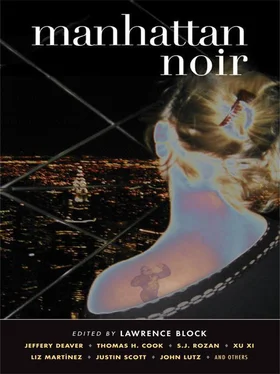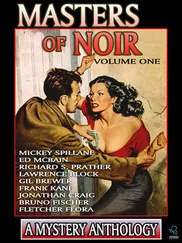Lawrence Block - Manhattan Noir
Здесь есть возможность читать онлайн «Lawrence Block - Manhattan Noir» весь текст электронной книги совершенно бесплатно (целиком полную версию без сокращений). В некоторых случаях можно слушать аудио, скачать через торрент в формате fb2 и присутствует краткое содержание. Жанр: Триллер, на английском языке. Описание произведения, (предисловие) а так же отзывы посетителей доступны на портале библиотеки ЛибКат.
- Название:Manhattan Noir
- Автор:
- Жанр:
- Год:неизвестен
- ISBN:нет данных
- Рейтинг книги:3 / 5. Голосов: 1
-
Избранное:Добавить в избранное
- Отзывы:
-
Ваша оценка:
- 60
- 1
- 2
- 3
- 4
- 5
Manhattan Noir: краткое содержание, описание и аннотация
Предлагаем к чтению аннотацию, описание, краткое содержание или предисловие (зависит от того, что написал сам автор книги «Manhattan Noir»). Если вы не нашли необходимую информацию о книге — напишите в комментариях, мы постараемся отыскать её.
Manhattan Noir — читать онлайн бесплатно полную книгу (весь текст) целиком
Ниже представлен текст книги, разбитый по страницам. Система сохранения места последней прочитанной страницы, позволяет с удобством читать онлайн бесплатно книгу «Manhattan Noir», без необходимости каждый раз заново искать на чём Вы остановились. Поставьте закладку, и сможете в любой момент перейти на страницу, на которой закончили чтение.
Интервал:
Закладка:

Lawrence Block, Charles Ardai, Carol Lea Benjamin, Thomas H. Cook, Jeffery Deaver, Jim Fusilli, Robert Knightly, John Lutz, Liz Martínez, Maan Meyers, Martin Meyers, S. J. Rozan, Justin Scott, C. J. Sullivan, Xu Xi
Manhattan Noir
The Akashic Books Noir Series, 2006

INTRODUCTION
The City.
See, that’s what we call it. The rest of the world calls it the Apple, or, more formally, the Big Apple, and we don’t object to the term. We just don’t use it very often. We call it the City and let it go at that.
And, while the official city of New York is composed of five boroughs, the City means Manhattan. “I’m going into the City tonight,” says a resident of Brooklyn or the Bronx, Queens or Staten Island. Everybody knows what he means. Nobody asks him which city, or points out that he’s already in the city. Because he’s not. He’s in one of the Outer Boroughs. Manhattan is the City.
A few years ago I was in San Francisco on a book tour. In conversation with a local I said that I lived in the City. “Oh, you call it that?” he said. “That’s what we call San Francisco. The City.”
I reported the conversation later to my friend Donald Westlake, whose house is around the corner from mine. “That’s cute,” he said. “Of course they’re wrong, but it’s cute.”
The City. It’s emblematic, I suppose, of a Manhattan arrogance, of which there’s a fair amount going around. Yet it’s a curious sort of arrogance, because for the most part it’s not the pride of the native. Most of us, you see, are originally from Somewhere Else.
All of New York-all five boroughs-is very much a city of immigrants. Close to half its inhabitants were born in another country-and the percentage would be higher if you could count the illegals. The flood of new arrivals has always kept the city well supplied with energy and edge.
Manhattan’s rents are such that few of its neighborhoods are available these days to most immigrants (though it remains the first choice of those fortunate enough to arrive with abundant funds). But it too is a city of newcomers, not so much from other countries as from other parts of the United States, and even from the city’s own suburbs and the outer boroughs as well. For a century or more, this is where those young people most supplied with brains and talent and energy and ambition have come to find their place in the world. Manhattan holds out the promise of opportunity-to succeed, certainly, and, at least as important, to be oneself.
I was born upstate, in Buffalo. In December of 1948, when I was ten-and-a-half years old, my father and I spent a weekend here. We got off the train at Grand Central and checked in next door at the Hotel Commodore, and in the next three or four days we went everywhere-to Liberty Island (Bedloes Island then) to see the statue, to the top of the Empire State Building, to a Broadway show ( Where’s Charlie? ), a live telecast ( The Toast of the Town ), and just about everywhere the subway and elevated railway could take us. I remember riding downtown on the Third Avenue El on Sunday morning, and even as my father was pointing out the skid row saloons on the Bowery, a man tore out of one of them, let out a bloodcurdling scream, turned around, and raced back inside again.
I think I became a New Yorker that weekend. As soon as I could, I moved here.
“Why would I want to go anywhere?” my friend Dave Van Ronk used to say. “I’m already here.”
Manhattan Noir.
While I might argue Manhattan’s primacy (assuming I could find someone to take the other side), I wouldn’t dream of holding that everything worthwhile originates here. Even as so many Manhattanites hail from somewhere else, so do many of our best ideas. And the idea for this book originated on the other side of the world’s most beautiful bridge, with a splendid story collection called Brooklyn Noir.
It was that book’s considerable success, both critical and commercial, that led Akashic’s Johnny Temple to seek to extend the Noir franchise, and it was Tim McLoughlin’s outstanding example as its editor that moved me to take the reins for the Manhattan volume.
I sat down and wrote out a wish list of writers I’d love to have for the book, then e-mailed invitations to participate. The short story, I should point out, is perforce a labor of love in today’s literary world; there’s precious little economic incentive to write one, and the one I was in a position to offer was meager indeed. Even so, almost everyone I invited was quick to accept. That gladdened my heart, and they gladdened it again by delivering on time… and delivering what I think you’ll agree is material of a rare quality.
My initial request wasn’t all that specific. I asked for dark stories with a Manhattan setting, and that’s what I got. Readers of Brooklyn Noir will recall that its contents were labeled by neighborhood-Bay Ridge, Canarsie, Greenpoint, etc. We have chosen the same principle here, and the book’s contents do a good job of covering the island, from C.J. Sullivan’s Inwood and John Lutz’s Upper West Side, to Justin Scott’s Chelsea and Carol Lea Benjamin’s Greenwich Village. The range in mood and literary style is at least as great; noir can be funny, it can stretch to include magic realism, it can be ample or stark, told in the past or present tense, and in the first or third person. I wouldn’t presume to define noir-if we could define it, we wouldn’t need to use a French word for it-but it seems to me that it’s more a way of looking at the world than what one sees.
Noir doesn’t necessarily embody crime and violence, though that’s what we tend to think of when we hear the word. Most but not all of these stories are crime stories, even as most but not all are the work of writers of crime fiction, but the exceptions take place in a world where crime and violence are always hanging around, if not on center stage.
Noir is very contemporary, but there’s nothing necessarily new about it. In cinema, when we hear the word we think of the Warner Brothers B-movies of the ’30s and ’40s, but the noir sensibility goes back much further than that. When I was sending out invitations, one of the first went to Annette and Martin Meyers, who (as Maan Meyers) write a series of period novels set in old New York. Could Maan perhaps contribute a dark story from the city’s past? They accepted, and in due course the same day’s mail brought Maan’s “The Organ Grinder” and a present-day story from Marty.
Every anthologist should have such problems. Both stories are here, both show the dark side of the same city, and both are far too fine to miss.
Most of our contributors live in New York, though not necessarily in Manhattan. (It’s hard to afford the place, and it gets harder every year. New York is about real estate, and Justin Scott’s “The Most Beautiful Apartment in New York” illustrates this fact brilliantly.) Jeffery Deaver lives in Virginia and John Lutz in St. Louis, yet I thought of both early on; they both set work in Manhattan, and reveal in that work a deep knowledge of the city, and, perhaps more important, a New Yorker’s sensibility.
It seems to me that I’ve nattered on too long already, so I’ll bring this to a close. You’re here for the stories, and I trust you’ll like them. I know I do.
Читать дальшеИнтервал:
Закладка:
Похожие книги на «Manhattan Noir»
Представляем Вашему вниманию похожие книги на «Manhattan Noir» списком для выбора. Мы отобрали схожую по названию и смыслу литературу в надежде предоставить читателям больше вариантов отыскать новые, интересные, ещё непрочитанные произведения.
Обсуждение, отзывы о книге «Manhattan Noir» и просто собственные мнения читателей. Оставьте ваши комментарии, напишите, что Вы думаете о произведении, его смысле или главных героях. Укажите что конкретно понравилось, а что нет, и почему Вы так считаете.












